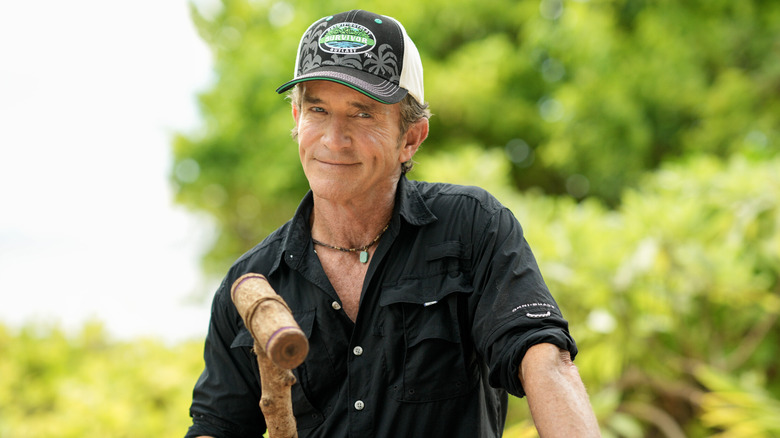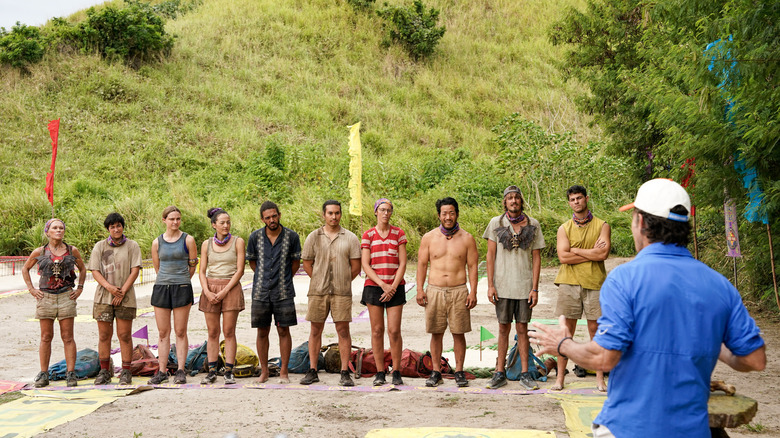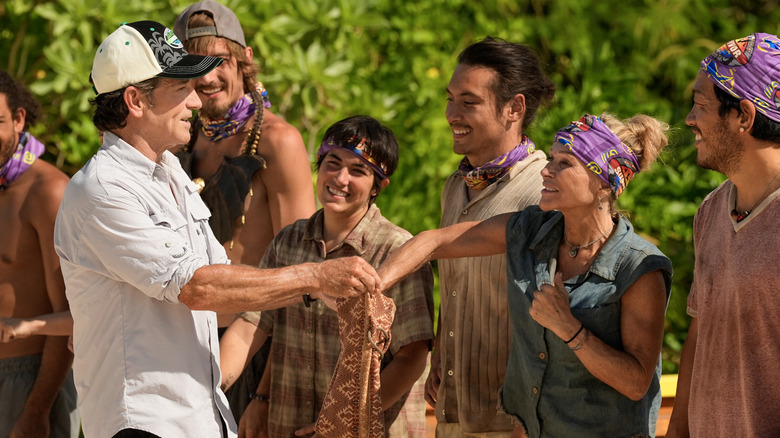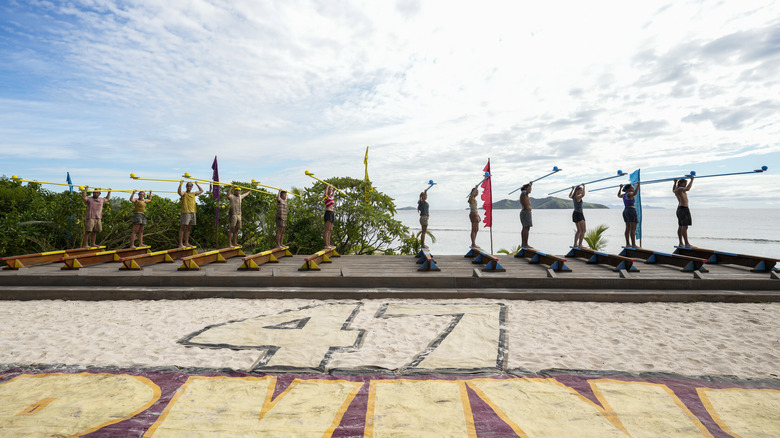How Many Days Is Survivor - And Why Did It Change?
After the COVID-19 pandemic brought life as we know it to a screeching halt in the spring of 2020, fans of "Survivor" — the reality competition show engineered and hosted by Jeff Probst that's been on CBS since 2000 — may have noticed something very different about their beloved series. Namely, the game, which once spanned 39 days and forced contestants to "outwit, outlast, and outplay" to become the Sole Survivor and win $1 million, was suddenly shortened to 26 days. What gives?
In an interview with Entertainment Weekly this year with the outlet's resident "Survivor" expert Dalton Ross, Probst revealed that he thinks that, while "Survivor" fans might have opinions about this pretty big change, it was necessary ... and he understands how they feel about the whole thing. After saying that there are "usually two points of contention" that fans have about the shortened timeframe, Probst said that he thinks some "Survivor" diehards are simply averse to anything different.
"Fans that simply don't want the game to change," Probst said, referencing one point of contention. "They want 'Survivor' to stay the same. I totally understand their point of view. In their mind, 'Survivor' is 39 days.... So they think that with the exception of Covid, which I'm sure we get a pass for, that we should have and still could go back to 39 days.... The second part is the difficulty. Twenty-six days simply can't be punishing enough because it's 13 fewer days. 'So do the math, Probst! The new era version of 'Survivor' is clearly easier!'" So why did the show make this change, and will it ever go back to 39 days?
Survivor's original season run was originally much longer
Fans who have been watching "Survivor" since the very beginning know that it is an incredibly grueling, physically demanding, and seemingly impossible game to complete; the first season, which was set in Borneo, was apparently riddled with filming difficulties as both the players and the crew did their best in the unstable and dangerous terrain of the Bornean jungle. Throughout the years, "Survivor" has staged its (39 day) competition everywhere from the Australian outback to the rural countryside of China to Micronesia; nowadays, the show is filmed in Fiji.
This is all to say that "Survivor" felt extra-daunting when the players had to survive 39 days in dangerous and remote locations, and audiences watching at home probably didn't even know the half of it. Aspiring sole survivors faced off against bugs, rats, and tropical storms, shrunk down to frighteningly low weights after barely eating, and experienced actually serious medical emergencies (though it should be said that Jeff Probst and the medical team who work on "Survivor" are always extremely quick to tend to any players who faint, are in danger of getting infections, or anything of the sort). 39 days felt like a really, really long time; 26 days just doesn't feel as difficult if you're sitting on your couch and playing Monday morning quarterback while you watch "Survivor." As Probst argues, though, it's just as tough — and the change as also borne out of necessity.
Why Survivor was shortened
As Jeff Probst told Dalton Ross in that Entertainment Weekly interview, the play time on "Survivor" originally shortened so that players could safely quarantine for two full weeks — again, this was during the height of COVID-19 — before jumping in to play the game. Frankly, this makes sense. "How we landed at 26 days to begin with was [COVID]," Probst said. "The requirements of starting with a 14-day quarantine and then doing two 39-day seasons back-to-back and not being able to ever leave the island for anything once we started — we just couldn't do it. So we had to get creative. We landed at 26 days."
Still, Probst said he got pushback from people close to him, largely because they felt that a shorter timeline for "Survivor" would take away something special from the game. "There were people in my inner circle saying, 'You are going to destroy the franchise because you won't have enough good story content if you reduce your shoot by a third,'" the host revealed. "Meaning you need time for players like ['Survivor 45' winner and Probst's podcast cohost Dee Valladares] to have camp life and do challenges and go to Tribal and be interviewed. And there was a concern that shaving off a third would reduce too much of the time and leave you with episodes that weren't very interesting.' We considered everyone's opinion; we felt it would still work."
Will Survivor ever go back to 39 days?
Let's get one thing out of the way: there is one thing that Jeff Probst and the "Survivor" team did to help keep each season's story full and complete despite the short seasons. They made each episode 90 minutes long starting in Season 45, which aired back in 2023; with much longer episodes (they used to only run for an hour), the show can still include a ton of interpersonal drama and funny tidbits from the players' respective camps without stretching the timeline back to its original length. So would Probst ever consider going back? Maybe!
"The looming question is, 'Would you ever go back to 39 days?' We'll never say never," Probst said to Dalton Ross in that same interview before clarifying that, at least for the time being, the change is here to stay. "And I mean that we're always open to where the game takes us as much as where we take the game, but for the time being, 26 days is the game. And I get it: If somebody else were sitting in this seat, they might make a very different decision. Even people on our own team, I think there's some of them that kind of wish we were at 39 days. So it's not a right or wrong, it's just, this is what we're doing."
"Survivor" is currently in its 47th season, and all of the previous seasons are available to watch on Paramount+ — in case you're still really hankering for the classic 39 day game.



